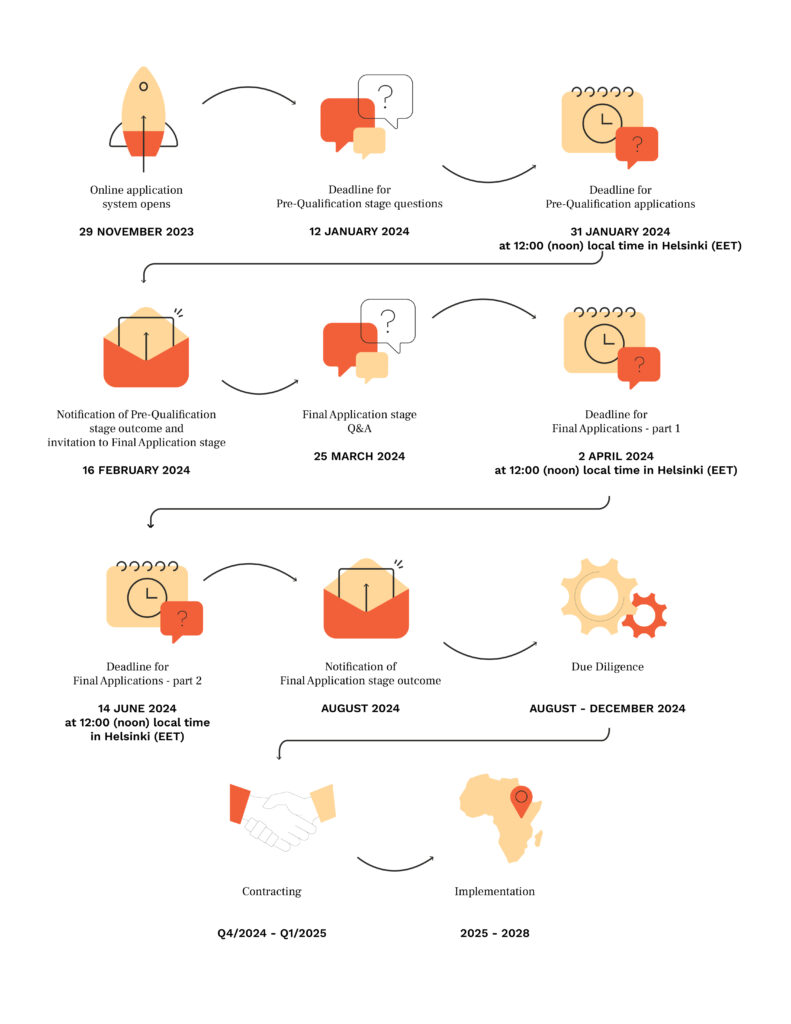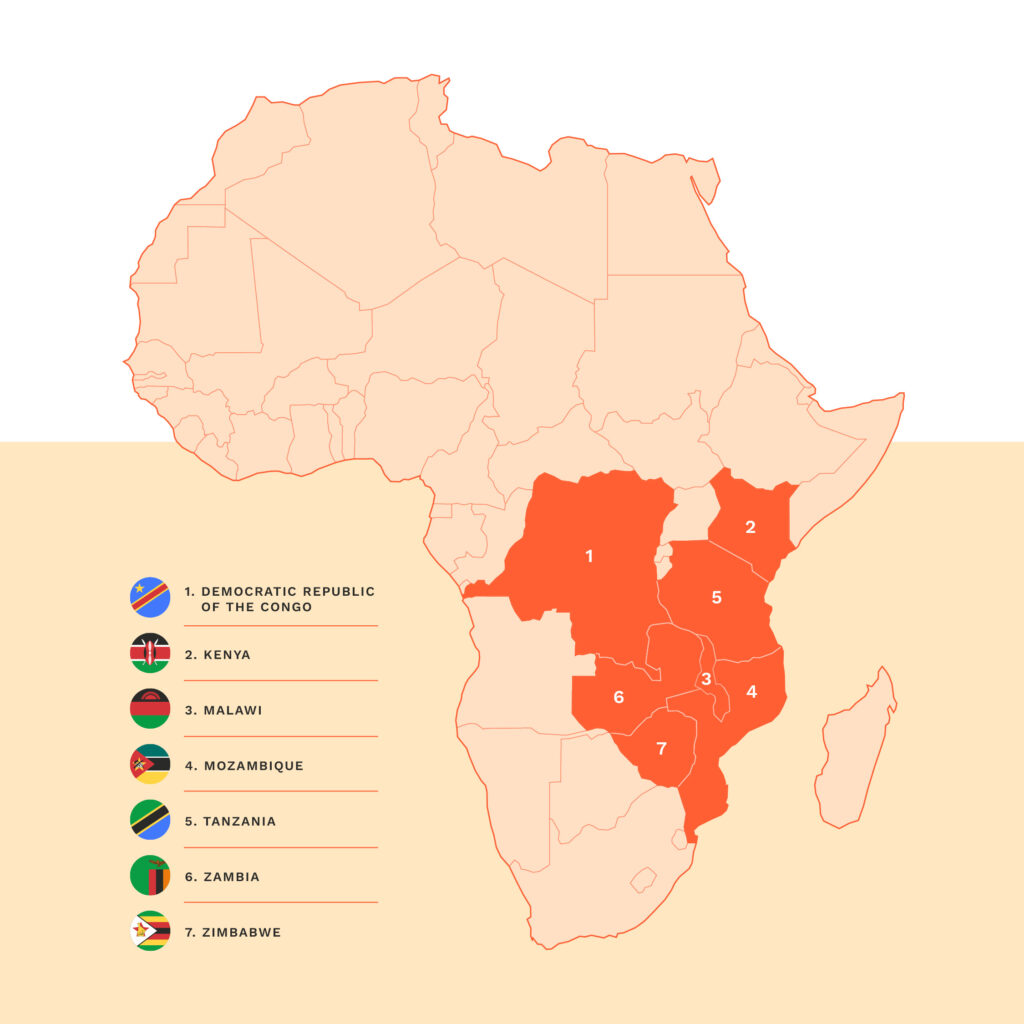Apply for funding
The second MCFA funding round closed for new applications on 31 January 2024. It supports access to and scale-up of high-technology clean cooking solutions in seven Sub-Saharan African countries.
The second MCFA funding round closed for new applications on 31 January 2024. It supports access to and scale-up of high-technology clean cooking solutions in seven Sub-Saharan African countries.
The second MCFA funding round is now closed for new applications. It was open for new applications between 29 November and 31 January for private companies ready to launch or scale up their modern and affordable clean cooking solutions in seven Sub-Saharan African countries.
If you have signed up to the MCFA online application system and submitted an application, then you can access the login page for the system here.
Please note that all applications must be submitted through the online application system. Proposals sent by e-mail will not be considered.
All communications related to the MCFA application process and related outcomes will be sent to Applicants via the online application system and Applicants are therefore advised to use a frequently used e-mail address for registration and application submission.
Please read the MCFA2 Application Guidelines carefully before beginning the Pre-Qualification application process. The Application Guidelines provide detailed information on eligibility and evaluation criteria. In case of discrepancies between the English text version of the Application Guidelines and the French or Portuguese translation, the English version shall prevail.
The MCFA2 application process is divided into two stages:
1) a Pre-Qualification stage and
2) a Final Application stage.
After the Pre-Qualification applications have been submitted, Nefco will screen them against the Applicant eligibility criteria defined in the MCFA2 Application Guidelines. Applicants passing the Pre-Qualification stage will be invited to the Final Application stage and asked to submit full business plans, financial clean cooking service offers and results from laboratory testing of the clean cooking technologies.

The MCFA project countries are: the Democratic Republic of the Congo, Kenya, Malawi, Mozambique, Tanzania, Zambia and Zimbabwe.

Once you have a user account for the MCFA online application system (SmartME), you can access the system directly via the link: smartme.adalia.fi/login/mcfa
The login link can be found at the top right corner of the page. If you are unable to log in, please e-mail us at mcfa@nefco.int.
During the application process, you can save your edits and return to an existing application by signing in with the same account. You can also add other people as contributors to the application, but please remember that the online system does not support simultaneous editing of the same application by multiple users. Remember to save your edits each time you work on the application. Once you have completed your Pre-Qualification application, submit it to Nefco by pressing ‘Submit’. Once you have submitted your Pre-Qualification application, you will no longer be able to make changes to it.
Once you have started the application process, we strongly recommend that you use the support function in the online application system to communicate any problems you may have. Questions or queries related to MCFA2 should be sent via this function by 12:00 (noon) Helsinki time (EET) on 12 January 2024. The questions and answers will be published for all registered applicants via the online application platform on 19 January 2024.
The MCFA offers a combination of results-based financing (RBF), non-reimbursable catalytic grant financing and technical assistance (TA) to companies active in the clean cooking market to grow and scale up their businesses in the Democratic Republic of the Congo (DRC), Kenya, Malawi, Mozambique, Tanzania, Zambia and Zimbabwe.
During the programme implementation phase, funded clean Cooking Service Providers will be eligible to receive targeted technical assistance funded by MCFA, including advice on, for example, product and business model development (e.g. PAYGO and SUM), basic business fundamentals and formalisation, strategy and human resource management.
MCFA2 funding is offered under two funding windows: the Catalytic Funding Window and the Scale-Up Funding Window.
The Catalytic Funding Window is targeted at earlier stage companies with the potential to scale their operations in selected Project Countries, i.e., in DRC, Malawi, Mozambique, Zambia or Zimbabwe. Up to 50% of the requested MCFA financing within this window can be provided in the form of non-reimbursable catalytic grants and the rest as results-based financing (RBF). The minimum co-financing must be equal the RBF component, i.e., a minimum of 50% of the total MCFA2 funding requested.
The Scale-up Funding Window is open to Applicants in all Project Countries and is targeted at more mature companies with the potential to scale existing operations in a Project Country or to enter a new market in an MCFA Project Country. Up to 30% of the requested MCFA financing within this window can be provided in the form of non-reimbursable catalytic grants and the rest as results-based financing (RBF). The minimum co-financing must be equal to the RBF component, i.e. a minimum of 70% of the total MCFA2 funding requested.
Please note that Applicants offering residential clean cooking services with ≥1,000 historic stove unit sales (Tier 1-5, any type or technology) or ≥100 biodigester unit sales in a Project Country or ≥10,000 stove unit sales or ≥1,500 biodigester unit sales in a specified Sub-Saharan country can only apply to the Scale-Up Window.
For-profit companies acting individually or on behalf of a project consortium can apply for funding.
Applicants should be legally incorporated and included in the register of for-profit companies in the project country (the Democratic Republic of the Congo, DRC; Kenya, Malawi; Mozambique; Tanzania; Zambia and Zimbabwe) or commit to being incorporated and registered as such before signing a possible MCFA2 funding agreement with Nefco.
Applicants can be experienced providers of residential, commercial or institutional clean cooking services, utilities or mini-grid operators or companies deploying standalone solar systems that could offer e-cooking services in conjunction with their main operations.
Applicants may include non-profit entities, public institutions, community-based organisations or other non-commercial entities in the project implementation as consortium members or project partners.
All Applicants must meet the eligibility criteria defined in the MCFA2 Application Guidelines [Link to be available 29 Nov].
MCFA2 can support clean cooking services that are based on sales of:
MCFA particularly encourages clean cooking services incorporating pay-as-you-go (PAYGO) and/or stove use monitoring (SUM). Clean cooking services provided under the integrated ‘tool and fuel’ model are particularly incentivised.
Clean cooking services based on stove sales only are not eligible for MCFA support. Sales of energy-efficient commercial cooking services and institutional cooking services to serve critical needs related to, for example, education, food security, sterilisation of medical equipment and clean drinking water can also be supported.
Read an early stage evaluation summary report of the first Call for Proposals (MCFA1).